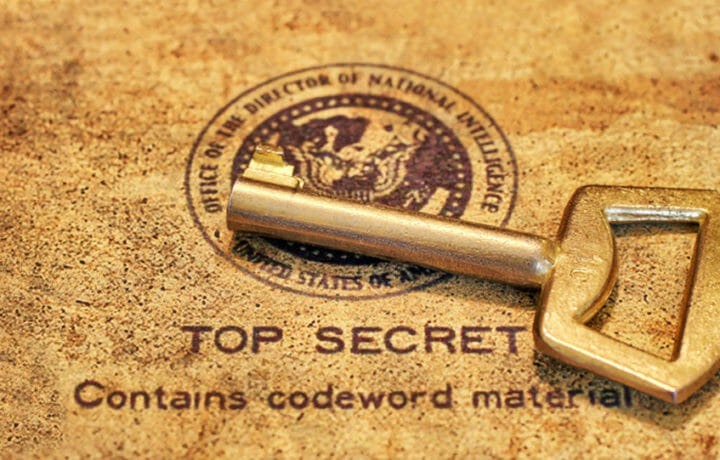The security clearance adjudication process is unnerving not because you are a hardened criminal, but because you are a normal person. When someone passed you a joint your freshman year in college, you didn’t think: One day I will want to work for a defense contractor and design aircraft landing gear for a living! Rather, you puffed and passed, because it’s what everyone else was doing. Or before getting that electrical engineering degree, you spent eight years studying Portuguese literature, and it all made sense at the time, but now those student loans suddenly have an extra zero on the end, and you aren’t the pillar of financial stability that investigators like to see when they pull your credit report.
In other words, you are only borderline eligible for a clearance. You didn’t hold up a Circle K, but you didn’t always pay your credit card bills on time, either.
So what do you do? Should you bother applying for a job that requires a clearance if you know there’s a chance you won’t get it? It depends, says Kel McClanahan, a national security lawyer. “Gaming out whether to try for a security clearance is really more art than science,” he says.
Few adverse clearance decisions are based on one factor, he explains. “There’s a thing called the ‘whole person concept.’ Adjudicators consider who you are holistically, so generally, if you are worried about one thing in your past, but everything else is fine, go for it.” Problems arise if you are worried about multiple ‘one things,’ or one particularly bad thing—say that one time when you joined the Iranian Revolutionary Guard, or hacked into the NSA.
With respect to drugs, the general rule is that you shouldn’t worry too much if it was either a long time ago, or if it were a small amount more recently.
“You can have smoked three times last year, or smoked twenty joints in 2010, but you can’t have smoked twenty joints last year,” he says. (This general philosophy applies also to one’s criminal history. A reckless driving arrest a decade ago isn’t a deal breaker; a reckless driving arrest last week is.) Marijuana smoking is a uniquely complicated issue in recent years due to its legalization in several states. Adjudicators don’t care that Colorado is cool with it. The federal government is not, and that is the standard they use.
Any behavior that doesn’t err on the sideline of caution falls under guideline E, which is a catch-all guideline for questionable conduct or questionable judgement in clearance adjudication. “The mindset is: we apply federal law. And if it is illegal in federal law, that is what we apply,” he says.
PAY YOUR BILLS
Questions of judgement are also raised if you have ever failed to pay off a debt, or have too much legally accumulated debt—even if you are making payments on it. When it comes to finances, the government will consider the source of the debt – medical bills are weighted differently than luxury expenditures
Another borderline issue is foreign influence. It is not simply a matter of being actively blackmailed by a foreign intelligence service. It’s much more prosaic than that.
“It can sometimes be a concern when you have a relative who lives overseas. This is a particularly bad problem for intelligence agencies because, for instance, the people who speak Farsi fluently are from Iran. And if you are of Iranian descent, you probably have relatives who still live in Iran,” says McClanahan.
It’s not necessarily the case that investigators think you’re taking orders from distant family, but rather, that said family members are susceptible to being kidnapped, with you being told to give up your secrets, or Uncle Bob dies.
Adjudication decisions, and the sometimes arbitrary nature of the entire process, comes down to motivation. Nobody knows what makes someone leak, or sell secrets, or betray their country or colleagues. So when agencies catch somebody, they tend to analyze them deeply, look for anything that is unusual in their behavior or demeanor and put it up on a board as a possible sign of a security risk.
Notably, different agencies have different dislikes when it comes to a clearance applicant. If you want a job with the Central Intelligence Agency, if there is a reason to deny you a clearance, they will deny you a clearance. The FBI has issues with drugs and crime, but doesn’t care as much about foreign contacts. If you have a grandmother who lives in China, it’s not an instant denial. The Defense Department is the most reasonable overall when it comes to security clearance adjudication, says McClanahan. “We would hold them up as the gold standard,” he says.
If you are worried about a security clearance application issue, you are better served to talk to a lawyer beforehand rather than waiting until your clearance is denied or revoked.
“A lawyer can tell you whether a piece of information you are listing on your clearance application is even necessary to list,” says McClanahan, “or whether the way you are phrasing something makes it sound worse than it actually is.” A lawyer will also know when you need to explain more about a particular issue.
“It’s much harder for us to fix a problem than to prevent it,” he says.




